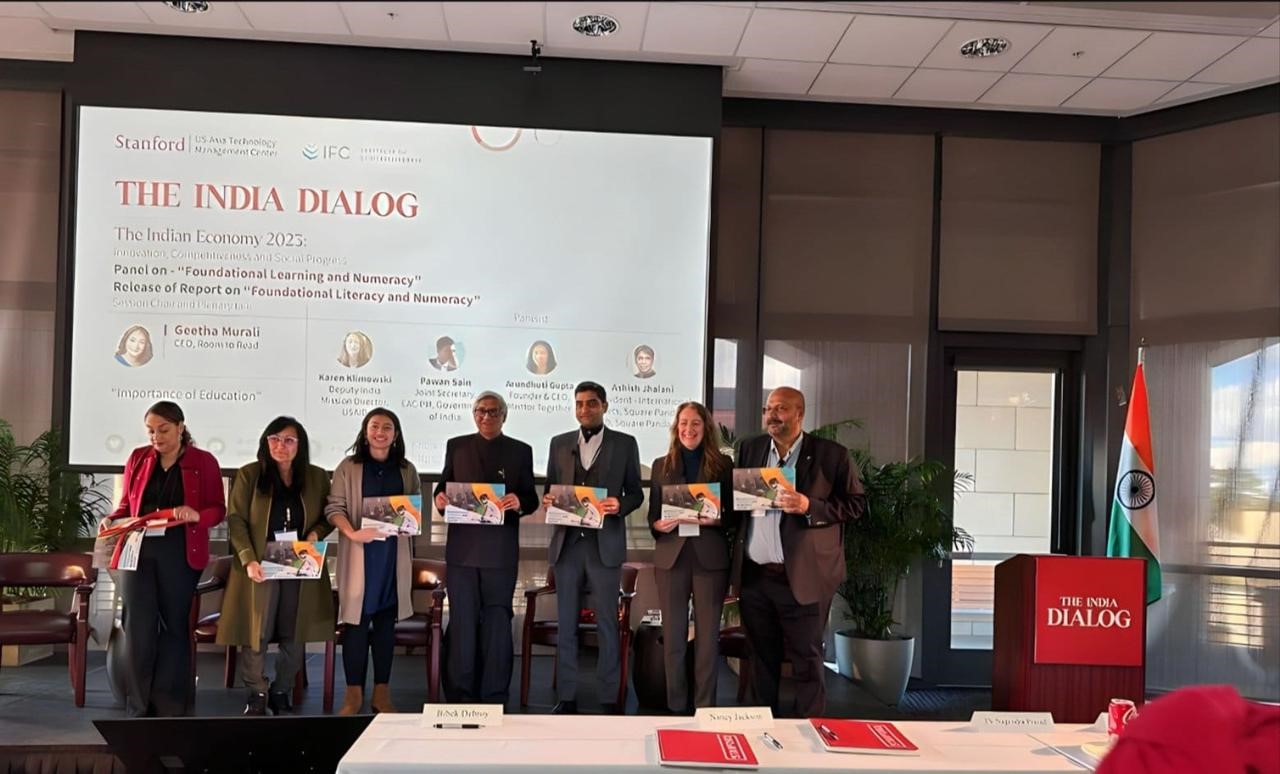EAC-PM
The Foundational Literacy and Numeracy Report submitted to EAC-PM by IFC released by Dr Bibek Debroy in the India dialog conference
Posted On:
24 FEB 2023 8:48AM by PIB Delhi
Highlights:
- The Foundational Literacy and Numeracy report was released by Dr Bibek Debroy, Chairman, Economic Advisory Council to the Prime Minister (EAC-PM).
- The report was released at #TheIndiaDialog organised by Institute for Competitiveness and US-Asia Technology Management Center, Stanford University, on February 23 & 24, 2023.
- The second edition of the State of Foundational Literacy and Numeracy highlights the focus on language as a critical foundational skill and its importance in acquiring early literacy.
- A special section in the report covers insights into states/UTs to assess children's learning outcomes on the National Achievement Survey (NAS) and Foundational Learning Study (FLS) 2022.
- State profiles and their performance on Distance from the Frontier are covered, enabling states/Union Territories to track progress on foundational learning.
The second edition of the foundational literacy and numeracy (FLN) report captures the role of language in education and focuses on improving the learning outcomes using appropriate assessments and medium of instruction. It captures the fundamental concepts children require to become skilled readers and highlights distinct challenges faced in a multilingual environment. In this context, it is crucial to understand the need to integrate the medium of instruction and teaching in languages familiar to children. A section of the report explicitly focuses on the numerous initiatives currently implemented at the national and state level in collaboration with public-private organizations, demonstrating their efforts in achieving foundational learning goals as outlined in NIPUN.
The report continues to be a benchmark for states and union territories to track their performance relative to their peers in achieving universal foundational learning by 2026-27. The report’s findings cover the role of nutrition, access to digital technology and language-focused instructional approach. It is further recommended to undertake various assessments pertaining to the linguistic system (includes phonology, vocabulary/lexicon, and syntax), the orthographic system (includes symbols and mapping principles), and the writing mechanisms and move the focus to improving the periodicity of NAS and the sample size of FLS for assessing the learning outcomes effectively. And finally, the need for data monitoring at a disaggregated level for FLN outcomes is also required to be integrated into the system, along with clearly defined outcome-based indicators on pedagogical framework and education in India.

The report has been authored by Amit Kapoor, Chair, Institute for Competitiveness, Natalia Chakma, Researcher, Institute for Competitiveness, and Sheen Zutshi, Research Manager, Institute for Competitiveness.
The panelists for the release included Karen Klimowski, Deputy India Mission Director, USAID; Pawan Sain, Joint Secretary, EAC-PM; Arundhuti Gupta, Founder and CEO of Mentor Together, and Asha Jadeja, Founder of Motwani Jadeja Foundation and the panel was chaired by Geetha Murali, CEO, Room to Read.
In her keynote address, Geetha Murali said, “Foundational literacy and numeracy are linked to heath and economic growth of a nation. The other nuances of the Indian context important to be kept in mind is the automaticity required at both the Akshara and the text level as the Indian languages are Akshara based scripts,. So, as you are developing curriculum, the phonological awareness, phonics, fluency, vocabulary, comprehension have to be split out into lessons that are taught appropriately without overloading children.”
EAC-PM Joint Secretary, Pawan Sain highlighted how NEP is future of teaching and how it takes care of all the challenges faced in school education. He also highlighted innovative practices adopted by states for schools, teachers and children respectively.
Karen Klimowski, Deputy India Mission Director, USAID said, “ We also must focus on sustainable impact i.e how do we make these programmes more meaningful and sustained over the long term.”
Dr Amit Kapoor, Honorary Chairman, Institute for Competitiveness and Lecturer, Stanford University, said, “Focus on Literacy and Numeracy serves as as solid foundation for the early education for every child because it further prepares them to sustain themselves in the society.”
Dr Bibek Debroy, Chairman, EAC-PM in his concluding remarks said, “Foundational Learning is only one part of the educational cycle. I thank the Institute for Competitiveness for having done this study. I hope they will continue to do this year after year so that we can not only get a snapshot of where states are at a certain point in time but we can also gauge improvements over a period of time.”
About IFC
Institute for Competitiveness, India is the Indian knot in the global network of the Institute for Strategy and Competitiveness at Harvard Business School. Institute for Competitiveness, India is an international initiative centered in India, dedicated to enlarging and purposeful disseminating of the body of research and knowledge on competition and strategy, as pioneered over the last 25 years by Professor Michael Porter of the Institute for Strategy and Competitiveness at Harvard Business School. Institute for Competitiveness, India conducts & supports indigenous research; offers academic & executive courses; provides advisory services to the Corporate & the Governments and organises events. The institute studies competition and its implications for company strategy; the competitiveness of nations, regions & cities and thus generate guidelines for businesses and those in governance; and suggests & provides solutions for socio-economic problems.
****
DS/TS
(Release ID: 1901882)
Visitor Counter : 7215